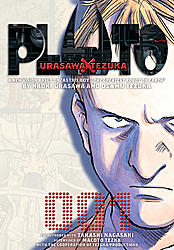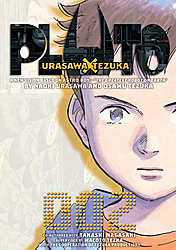Urasawa Naoki’s Pluto Comes to America:
Film Noir Meets Astro Boy
by McCamy Taylor
 Up until now, Japanese mangaka (writer/artist) Urasawa Naoki has been best known in the United States for Monster , his suspense/thriller graphic series which was made into an animated series. Early next year, Viz is scheduled to begin releasing two of his science fiction mangas. One is the completed project 20th Century Boys , a twenty volume plus work that defies easy categorization. It is part science fiction, part supernatural tale, part conspiracy thriller, part coming of age in Japan story. Many fans of Japanese graphic fiction consider it the best example of the genre. The first movie based upon the manga has just been released in Japan, and I expect that it will confuse some people who have not read the story which tends to go backwards and forwards in time a la The Watchmen to which it has been compared.
Up until now, Japanese mangaka (writer/artist) Urasawa Naoki has been best known in the United States for Monster , his suspense/thriller graphic series which was made into an animated series. Early next year, Viz is scheduled to begin releasing two of his science fiction mangas. One is the completed project 20th Century Boys , a twenty volume plus work that defies easy categorization. It is part science fiction, part supernatural tale, part conspiracy thriller, part coming of age in Japan story. Many fans of Japanese graphic fiction consider it the best example of the genre. The first movie based upon the manga has just been released in Japan, and I expect that it will confuse some people who have not read the story which tends to go backwards and forwards in time a la The Watchmen to which it has been compared.
This is a review of the other manga which Viz is releasing, a project which I like even more. Pluto has been compared to Frank Miller’s The Dark Knight Returns because it is film noir meets Astro Boy . As much as I enjoy the work of Miller, Urasawa surpasses him in writing ability. He rivals Alan Moore as an author, and his artwork is stellar, particularly his ability to convey complex emotion through facial expression.
The title of Pluto is an unfortunate one for Disney saturated U.S. audiences, who will immediately think dog . This is not Mickey Mouse’s Pluto. This is Pluto as in the Roman god of death. And this is not Tezuka Osamu’s Astro Boy though he is co-credited as an author. Atom, in this series, in drawn in a realistic style that makes him seem more a boy than a robot. The same goes for the hero of the tale, Inspector Gesicht of Europol. He has a wife (also a robot who looks human) who wishes that he would take a break from his job solving crimes and tracking down killers---like the killer of the world’s most beloved robot, the Swiss mountaineer, Montblanc, whose death begins the story.
Montblanc, we are told, loved nature and children and was a poet----as if his very name did not bring to mind Shelley’s famous poem. I suggest that anyone who decides to read Pluto read Mont Blanc by Shelley first, taking note of such lines as
“I look on high
Has some unknown omnipotence unfurled
The veil of life and death?”
Someone or something is killing the great robots of the world. The agent of death appears as a whirlwind. At each crime scene, it leaves behind a set of horns. At the same time, something or someone is killing humans who have advanced the cause of robots’ rights in a world in which robots and humans live together, sometimes less than harmoniously.
The murders seem to be related to a savage war that is referred to as the 39th Central Asian Conflict, a United Nations operation in which robots killed other robots. The seven most powerful robots in the world, sometimes referred to in the manga as potential weapons of mass destruction, have been programmed not to kill humans, but each of them killed thousands of other robots during that war. And this has left some of them emotionally scarred, for in the world of Pluto artificial intelligence technology has advanced to the point where robots can grieve for the death of another robot---a point that becomes clear when Gesicht has to tell the robotic wife of a police robot who died in the line of duty that her spouse will not be coming home. Though she and her husband have a primitive design compared to Atom and Gesicht, Urasawa is able to convey her emotions through a minimum of words and panel art.
 Later, in chapter eight of the first volume, Atom is introduced to the story. Gesicht marvels at how advanced (human) his AI is. The robot eats ice cream, is distracted by toys, gets excited—all like a real boy. By this point, the reader has begun to suspect that Gesicht may also be more human than he allows himself to realize. After the two exchange memory chips in order to help with the investigation into the murders (which presumably target both of them), Atom excuses himself to use the restroom. There, he cries over what he has discovered buried within Gesicht’s memories. The reader will have to wait a bit longer to begin to unravel this additional mystery.
Later, in chapter eight of the first volume, Atom is introduced to the story. Gesicht marvels at how advanced (human) his AI is. The robot eats ice cream, is distracted by toys, gets excited—all like a real boy. By this point, the reader has begun to suspect that Gesicht may also be more human than he allows himself to realize. After the two exchange memory chips in order to help with the investigation into the murders (which presumably target both of them), Atom excuses himself to use the restroom. There, he cries over what he has discovered buried within Gesicht’s memories. The reader will have to wait a bit longer to begin to unravel this additional mystery.
There are many side stories within the broader tale. For instance, there is the human serial killer who targets robots (not considered murdered)---that case has a special significance for Gesicht. There is a robot who has been condemned to prison because he was able to overcome his programming and kill human beings. One of the world’s super robots is a pacifist who refused to fight in the Asian Conflict, but that does not prevent her from being a target. A robot veteran of the fighting in Asian seeks to forget the painful memories by learning music from his new employer, a blind human composer.
The relationships between humans and robots are often strained. The various robot creators have different attitudes towards their creations. Some people fear robots. There are the equivalent of KKK type groups that want to destroy them. Others idealize them. Robots strive to become as human as possible, marrying, adopting children, “eating” and “drinking” simply because humans do it.
Pluto is a work in progress. There are currently 55 chapters of about 25 pages each completed. Urasawa likes to do long projects, so there may be a lot more to come. If you like serious science fiction that really gets in there and explores its topic in detail and you enjoy well paced suspense fiction with lots of intriguing characters, then Pluto is a great read.
© 2008 McCamy Taylor
Bio: C'mon. You know who McCamy Taylor is... Former Aphelion Assistant Short Story Editor, now Serials and Novellas Editor, author of many stories in Aphelion and elsewhere. Use Google to catch up on her more recent work. It's worth the effort.
Comment on this story in the Aphelion Forum
Return to Aphelion's Index page.
|




